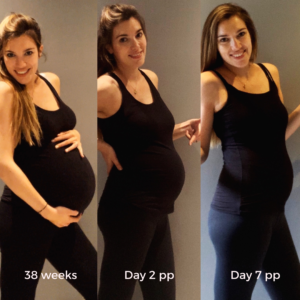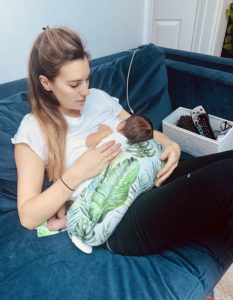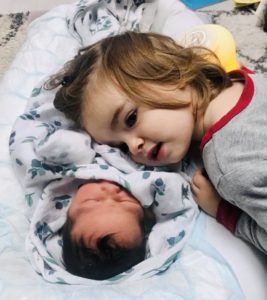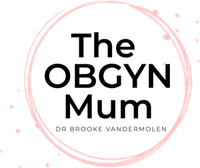It didn’t matter that I had been through it before. The shock of the sudden transition from pregnant to postpartum body was still a difficult adjustment for me.
Some things are great about not being pregnant anymore:
- Almost instantaneous relief on your bladder and not needing to go to the bathroom 5 times per night.
- Not feeling so heavy.
- Being able to bend forward to pick something up!
But there are a lot of changes and challenges to your postpartum body that are much harder to adjust to!
Here is some more about each of those changes and what to expect:
Body shape
If I hear the phrase “get your body back” one more time I think I’ll scream! The pressure on women to make their body shape change instantly after the baby is out is immense.
Your body has grown a human, and in that time some changes, such as the shape of your hips, may actually have changed permanently.
However, of course the majority of your bump will have been baby, and water. So you will, of course, notice a reduction in the size of your abdomen straight after birth. For some it’s very dramatic, others less noticeable.

Over the next few days after birth uterine involution takes place, which you can see in these pictures of me. Your uterus needs to contract down after birth to being smaller than the size of your fist, and return to its rightful place deep inside your pelvis.

You may continue to feel abdominal pains or contractions, which may we worsened by breastfeeding, as it shrinks in size.
I always tell women to expect to leave hospital with at least a 24 week size bump (aka looking 6 months pregnant) so dont pack your pre-pregnancy clothes in your labour bag!
After your uterus has contracted, you will most likely still have some additional fat stored and water retention. This will have been part of how your body nurtured your baby and pregnancy.
Much of this will come off over time by itself, but you can also help by maintaining a healthy diet and exercising once given the all-clear to do so.
I feel by having a realistic expectation of what will happen, you can maintain perspective about how and when you can expect your body to feel more like your own.
Be kind to yourself and allow plenty of time. Your priorities have completely shifted, and healthy eating and exercise aren’t very easy to fit in around a newborn. You will eventually be able to plan a routine again, and of course exercise and a healthy lifestyle is really important but so is your mental health and confidence!
Breasts
Whether you choose to breastfeed or not, you will notice;
- Darkening of the nipples
- Increase in breast size
- Feeling of fullness or engorgement.
If you begin to nurse your baby, your nipples will change shape although this may take a few days.

Around days 3-5 you usually notice your milk comes in which can be painful or uncomfortable. Frozen green cabbage leaves can be placed in your bra to give some relief between feeds!
Breastfeeding can also be painful at first. The most important thing is to check the baby is latching on correctly. Even if well positioned and latched, the nipples may take some time to toughen up. This pain should improve after a few days.
Once your milk comes in fully, you may notice a different type of pain – more like a stinging, tingling or pressure sensation when the baby latches on. The sucking stimulates the ‘let-down’ reflex, encouraging the flow of milk which lasts around 10-15 seconds at the start of each feed.
Mood
The end of your pregnancy will result in big shifts in your hormone levels, which can affect your mood. This period is typically known as ‘the baby blues’ and can begin around days 3-5.
You may find that you feel extremely happy, whilst simultaneously tearful and crying, or swinging between different moods like an extreme form of PMT. This also coincides with a time of extreme sleep deprivation and your milk coming in, and is a totally normal part of recovery!
It is important to distinguish from post-natal depression (PND) which is more persistent, and may be accompanied by feeling withdrawn, lack of emotion towards your baby, persistent low mood, lack of energy and an array of other possible symptoms.
If you are unsure if you may have PND then please speak to your GP or midwife.
Bleeding
Regardless of what type of birth you had (vaginal or C-section) you will experience some vaginal bleeding.
It is likely to be heavy to start with (heavier than your period), especially when nursing. It should gradually get lighter until it stops.
For most it lasts 1-2 weeks, but it may last even 4 weeks.
If you find it stops and then restarts, or you begin passing clots or pieces of tissue then inform your midwife or doctor.
I recommend using maternity pads, at least initially because the thick pad can act as a cushion if you have a sore perineum as well. This time around I tried period pants towards the end. They are perfect for this type of scenario, where you need maximum absorbency but also may have light bleeding for quite a while!
I used the Flux underwear, but many others are available such as Thinx, Wuka or Modibodi.
Wound pain
Over 90% of women will have a wound, either from a C-section or a repaired tear or epsiotomy. It is important to care for your wound to help them heal.
I have my top tips for healing from a C-section here.
Here are my tips for healing a perineal wound.
Sleep & night sweats
This will probably be the biggest change you will notice! Being forcibly woken every 1-2 hours for the first few days by a screaming, hungry baby is something I’m not sure I will ever get used to…

The best advice i can give is to try to minimise your plans in the early weeks, and get to bed as early as you can, even if only to read or watch a series. And remember that it is temporary!
Another change that no-one adequately warned me about was the night sweats! After pregnancy your oestrogen hormone levels drop which can cause your body to mimic some of the changes women experience in menopause, including night sweats.
If you are also breastfeeding it can supress ovulation and therefore oestrogen levels further, causing the night sweats to last longer than they otherwise would!
For many women the night sweats stop after a few weeks, but they may last longer, up to 6 months if you breastfeed. During this time it’s really important to stay hydrated and wearing lightweight, breathable clothing may help.
Joints
I dont feel I was adequately warned about how painful joints can be postnatally! It makes sense if you think about it – the weight you are carrying has suddenly shifted and your joints had already become more lax to help accommodate the changes in the pregnancy.
Over time this will settle, this is the reason you are advised to avoid exercise for the first 6 weeks to prevent any undue stress or strain. Staying active during pregnancy will help to ease this change postnatally.
Did you notice any other changes to your postpartum body you wish to prepare other mothers for? Tell me by leaving a comment below!
